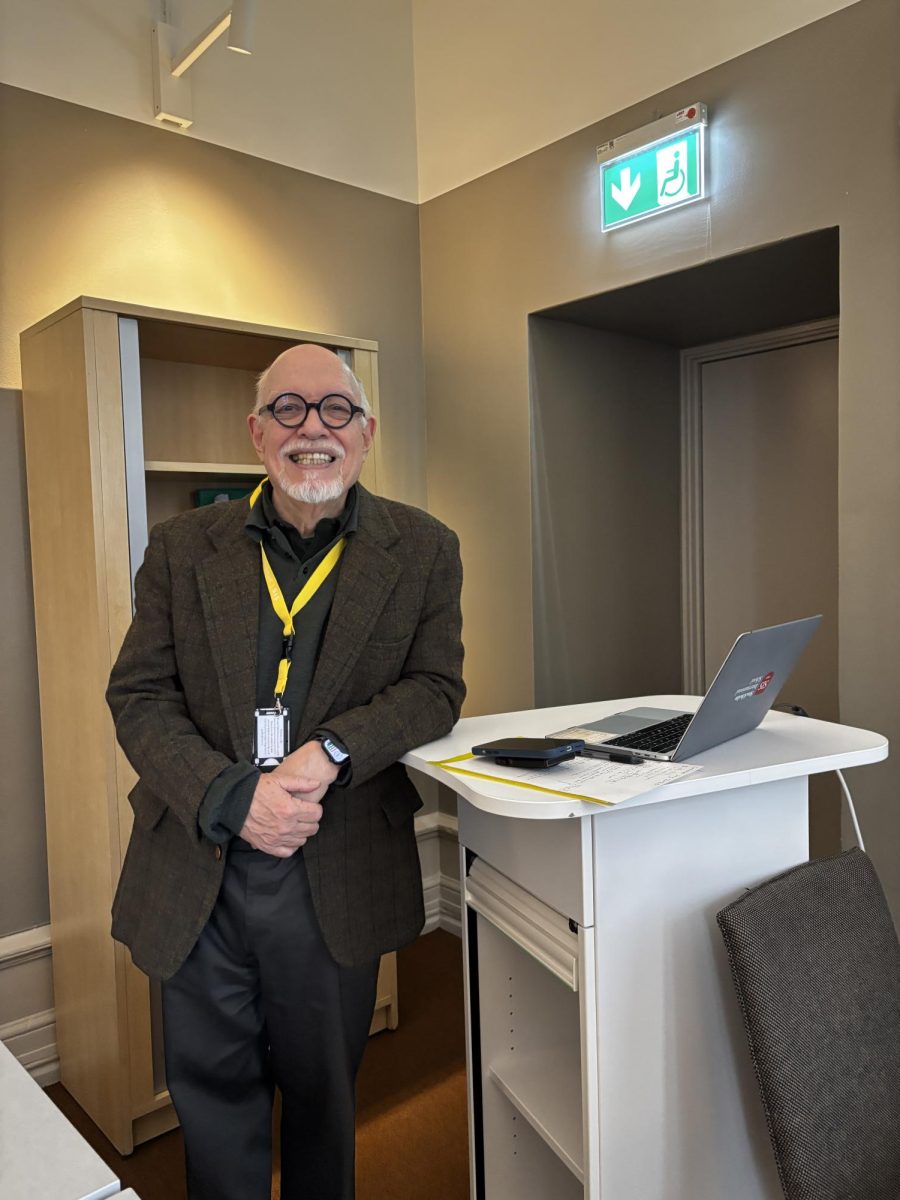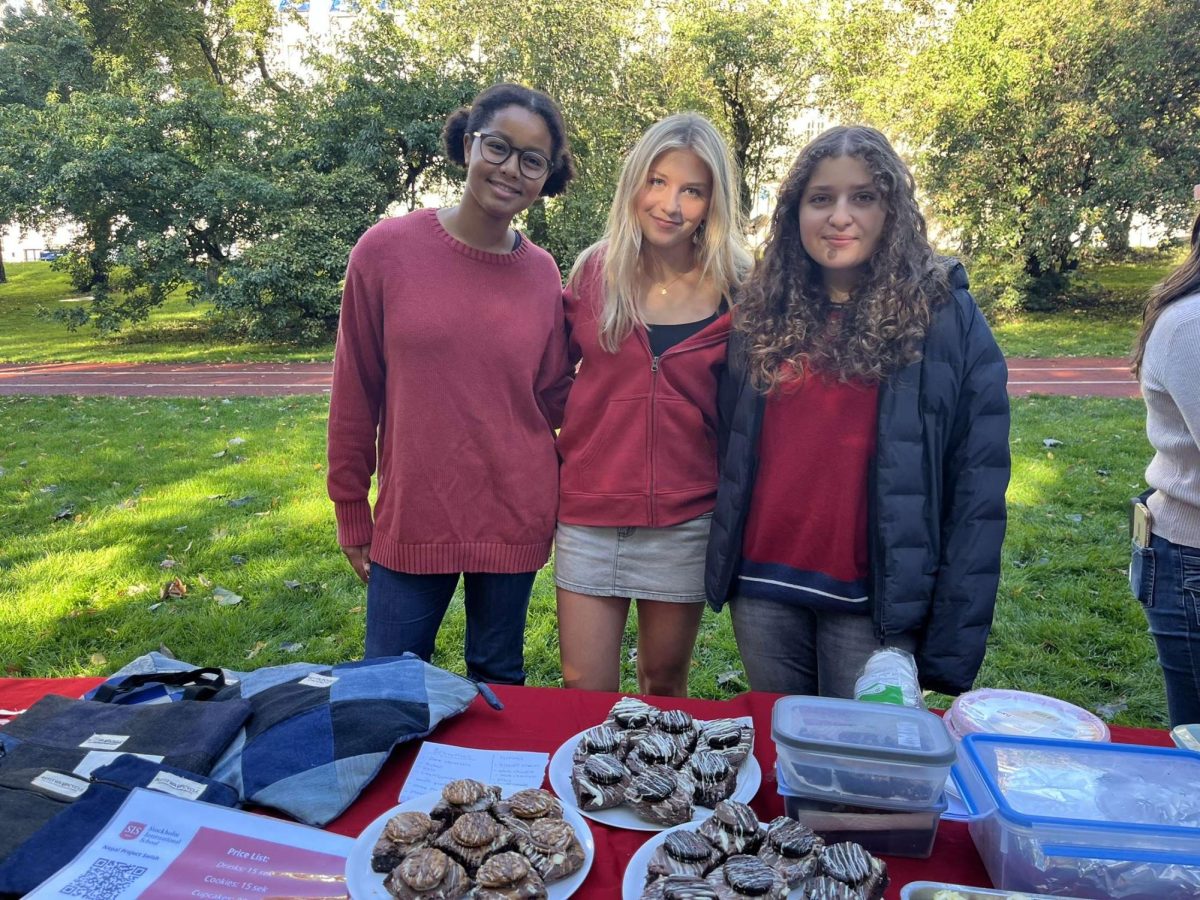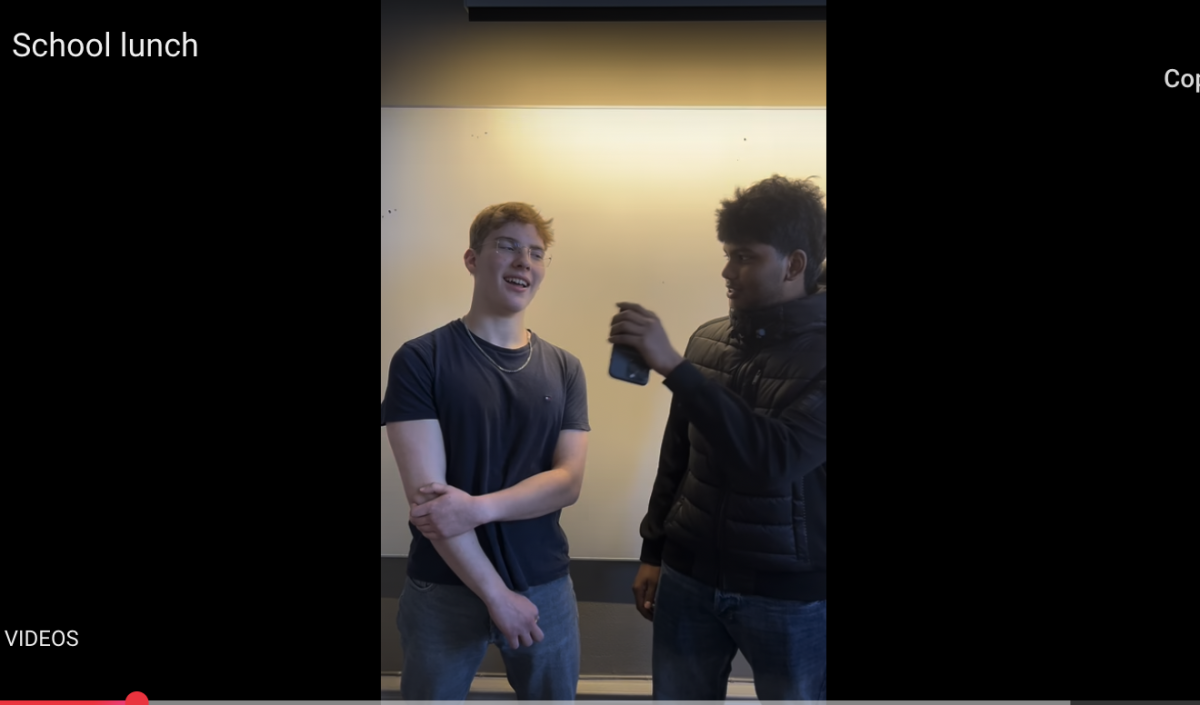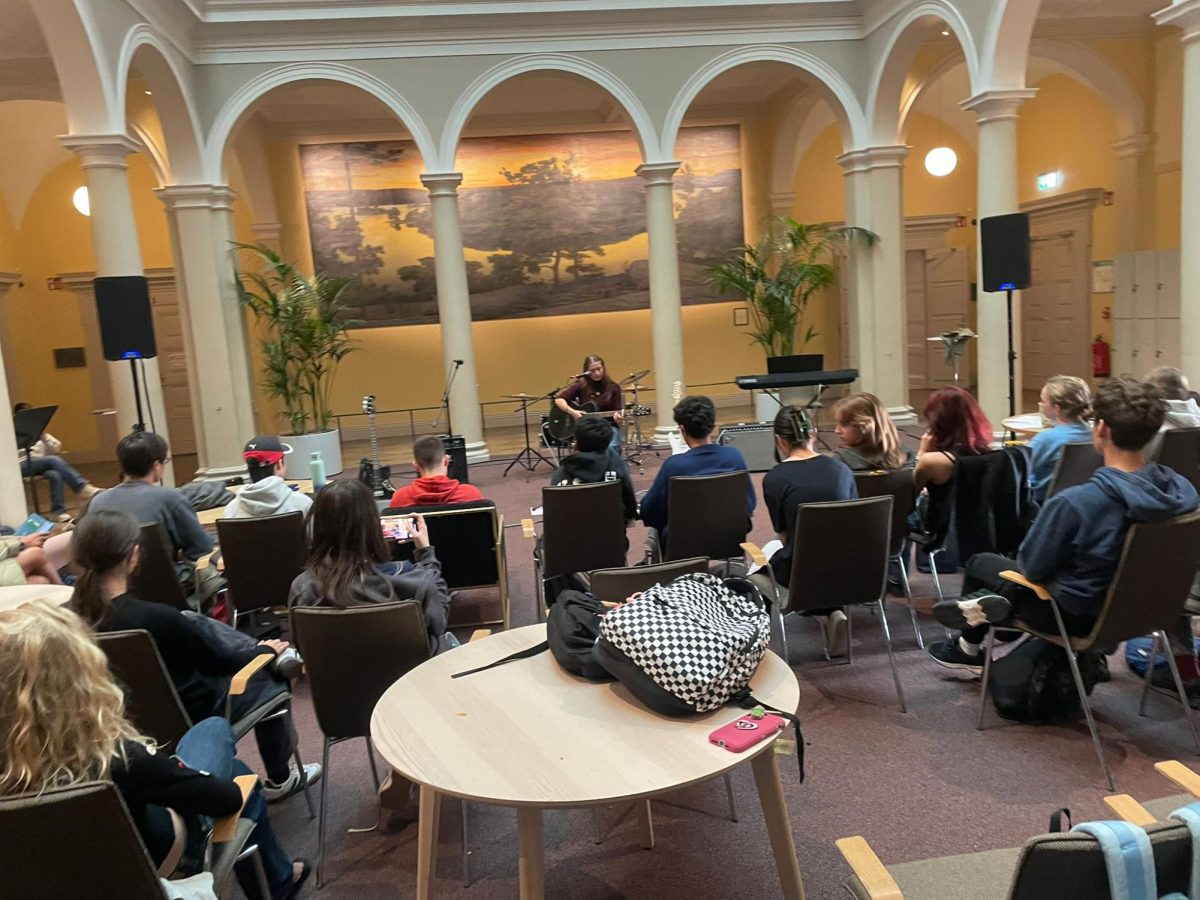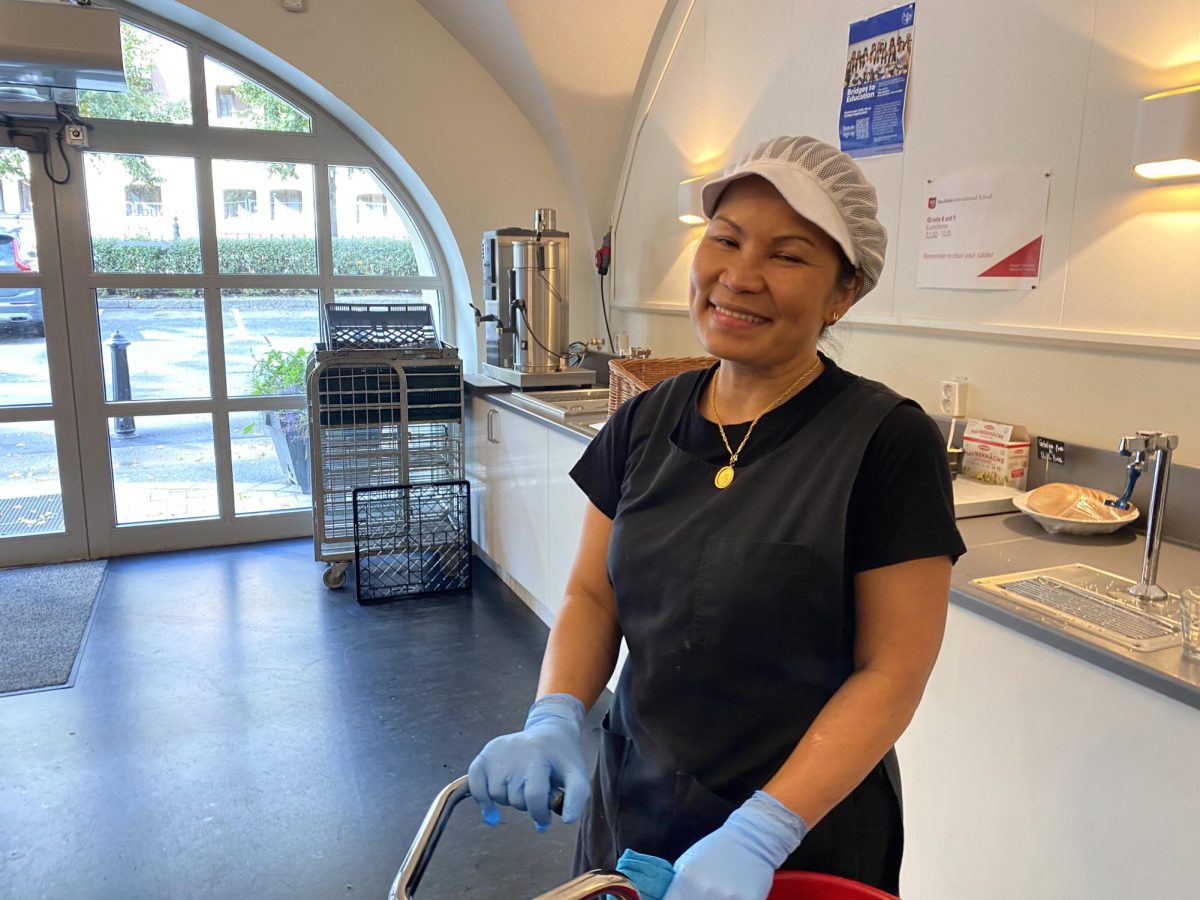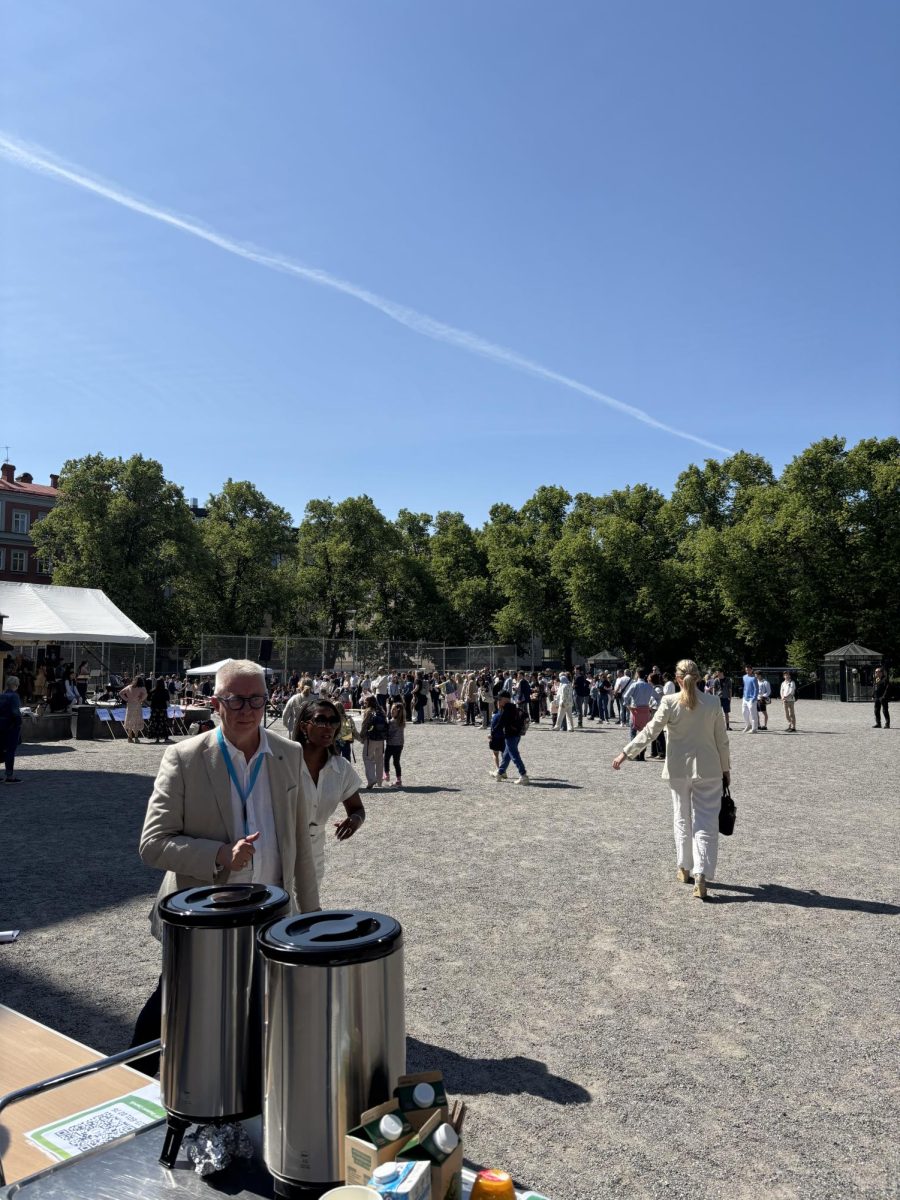Students attend sessions of choice to hear the speakers’ captivating stories starting from the moment they received their diplomas and ending in their current jobs/occupations with stops at milestone in between. Quirky Quibbler writers were asked to share their experiences from the sessions they attended during this enriching event organised by Ms Henningson and Ms Sethi.
Noam Krav El by Maude A.
Noam Krav El is a clinical psychologist who works part time as a counsellor at our school, and has his own therapy clinic here in Stockholm. He has had countless years of experience at mental hospitals and boarding schools with children, adolescents and also adults. In the lecture, Krav El takes time to explain the different branches in Psychology such as clinical, social, cognitive and developmental psychology and how they all differ from each other. He also explained how Psychiatry and Psychology go hand in hand, and how both careers work together to treat patients. Something that was particularly memorable in his presentation were his two main take-aways from his experience with Psychology. His first revelation was that it is absolutely crucial that one needs to be able to deal with the hard stories of the people one is working with, to embrace those difficulties rather than shy away from them. It was particularly fascinating to hear that it is actually very common for psychologists to have therapists, in order to be able to leave work and home life separate. The second revelation that he has come to understand throughout his career is that as a psychologist, you are not “saving people” you are helping them become a better version of themselves, or as he put it “trying to make them find the light in the dark.” Krav El said that whilst it is a difficult job, it is different to all other career choices, because you are dealing with people every day, each person opens up a new world and each client is different from the next. He said that his favourite part about being a psychologist by far, is how incredibly rewarding it was, to see people change the course of their lives for the better.
Dr. Jan W. Martel by Sebastian H. and Michele C.
Dr. Martel believes that being a doctor is fascinating and helps you gain a deeper understanding of what people are both biologically and emotionally. He studied at Karolinska Institute, one of the best medical universities in Europe, and finished his studies there in 1990. He later specialised and worked in the University Hospital in London. From the start, Dr. Martel didn’t know that he wanted to specialise in psychiatry, however he became passionate about it in his first year of medical school, when he learnt its vast branches and beauty. He has a lot of experience behind him; he has worked in both Sweden and in London. His most memorable and challenging experience was working with drug addicts and with inmates in Sweden’s toughest jails. He also gave some suggestions to students about how to become a great doctor. First of all, something very important is the theory; you really have to learn what you are talking about. Something else that is also important is that you need to be great with people, you need to understand their feelings and know how to handle them and their emotions. He finds a lot of pleasure in solving his patients’ problems. In his opinion, studying medicine is quite tough and being accepted to university to study is even tougher, as you need to be a top student in your classes just to be accepted.
Ivan Mustain by Romane D
Ivan Mustain has been working in the education field for over 40 years, including 20 years in the International Baccalaureate where he taught DP History. Initially, school wasn’t the place he pictured himself working in and education wasn’t the domain he thought of pursuing a career in; yet love sparked something in him, as he stated during his presentation “Love started me on the path to education, unrequited love”. It all started in 1962 when president John Kennedy informed Americans that missiles and nuclear war was coming their way after geopolitical tension in Cuba. One of Mustain’s teachers showed a short video instructing students to hide under a table or blanket if they ever found themselves in need of protection from a bomb. Aware of the absurdity of the claim, the young boy was unable to let that go, he told us “To be treated as an idiot made me very angry, so I raised my hand and said, ‘Sir we live 20 miles away from a US military base, what is this going to do?’” This question infuriated the teacher and caused Mustain to be sent to the principal’s office. On his way there he kept asking himself, “If I got all this attention from just one smart question, can I do this more?’”.
From then on, he joined a debate and philosophy class and got the recognition he deserved, all from just one question. Ivan Mustain followed the footsteps of the famous Greek philosopher Socrates, who was known as “the man who never stopped asking questions”, he passed down knowledge and trained youth to ask meaningful, reasonable, and polite questions. To him, history was more than just any subject “we don’t know anything, history is about nothing, because as you know the future doesn’t exist, the past doesn’t exist, and the present is the past. [he] studied something which did not exist.” History takes philosophical ideologies, and turns them into real events. He’s always asked himself, “How can you get nice and civilised people to do something evil” and discusses this concept in the majority of lectures.
Ivan Mustain ended his lecture by reflecting on his life and impact, he stated, “I can look back on my life now and say, I’m not rich but I have done things honourably and also I have gotten a lot of people, young people like yourself, to ask questions.” He believes that he has fulfilled his duty as an educator to train minds like ours to think differently and question everything that seems doubtful or odd. As an educator he shared with us that it is even more fulfilling to hear from former students and learn your impact on them, “That’s why I’ve done what I’ve done, my students came up and said thank you. You’ve taught us how to think, how to write, how to ask questions.” These aren’t “big things, just little things,” that students do to make him feel good. Ivan Mustain ended his presentation by giving us his key advice as an educator or teacher, and that is, to pick freedom when it comes to teaching. To any future teachers or professors out there, pick a school which gives you the freedom to educate others through creativity in order to have an everlasting and inspirational legacy.
Ted Nordström – by Zixiao S.
In this lecture, Ted Nordström provided a detailed account of his academic and professional journey. He came from the architectural design team responsible for Apple’s offline retail stores, first showcasing their designs for Apple locations in Chicago, USA, and Guangzhou, China. These structures embody Apple’s style, featuring an overall palette of to use white and natural timber that lends them a fluid, minimalist appearance. He then proceeded to elucidate the true essence of an architect’s role. The speaker explained that architects often serve as team leaders, as they bear the responsibility of determining the final form of a building. He then recounted his own academic journey, displaying some of his design sketches and outlining the essential portfolio presentation processes during university. Over the next two slides, he addressed the question of ‘what kind of person should/should not become an architect’. He explained that becoming an architect frequently entails being informed midway through a project that it has been rejected, or competing against several other architects for the same commission. Consequently, architects must possess considerable patience and the capacity for sustained, long-term work. Finally, the speaker addressed several questions, such as those concerning the academic year.
Mr. Ashida, Mr. Miyazaki, and Mr. Mori by Aika A.
Mr. Ashida, Mr. Miyazaki, and Mr. Mori are diplomats working at the Embassy of Japan in Sweden. Mr. Mori has been working in the Embassy of Japan in Sweden for the longest, about two years. However, Mr. Ashida said that he had been working as a diplomat for over 30 years in total. One intriguing answer we had from Mr. Ashida, regarding the question of why he wanted to become a diplomat, he said that he wanted to “be a part of preventing war”. He had been interested in history since childhood and learnt about the endless wars in human history. He believes that by making authentic, friendly relationships with people around the world, from the level of ordinary citizens to heads of states. “You may be desensitised to hearing reports of millions of deaths in war zones, but if you imagine that it was your friend in that article, how could you ever want to start a war?” sums up why he believes human connections are such a crucial part of diplomacy. There are multiple ways to become diplomats, said the other two who started working at different ministries until they were dispatched to Sweden to become a temporary diplomat. Students learnt that there are ways you can follow your passion but still pursue a path in diplomacy. Mr. Mori highlighted how he was able to meet nobel prize winners of RNA’s while helping out in the nobel prize ceremony as a diplomat, legends of the subject he studied in university, an unexpected connection between his past passion and his current work. Overall, the students were greatly inspired by the international talk provided by these three, much needed in our society now.
Vikram Nanwani by Michele C.
Vikram Nanwani is an engineer. He is originally Indian but was born and raised in Spain. He has completed his degree in the UK and now works as a product engineer/manager for Xylem, a water tech company, that has the aim to solve every challenge concerning water from pharmaceuticals, farms, or just city water management in general. Vikram didn’t know he wanted to do engineering when he was young, but what he enjoyed doing was solving mathematical problems and understanding the science behind everything around him in life. He then took a gap year in which he worked in metal factories to gain experience in engineering. He also did some job placements, which deepened his understanding of what engineering was and made him think that it could be fun. He later chose manufacturing engineering when it was time to choose a university. He first worked for a can manufacturing can, the first issue he worked on was to make sure that all cans had the lid placed properly. He believes the beautiful part of engineering is that it is an extremely broad subject, and that’s what he likes, not getting bored, and learning new things continuously.
Daniela Ling Vanerus Cassmer by Ingrid H.
Mother to a student in grade 12, Daniela Cassmer, became the new secretary general of Project Playground just 8 months ago. She began the session by showing a video of a young boy, who through the much needed help of the project, has regained joy and security in life, and been given the opportunity of an enhanced education, and aid in the home. Project Playground is a humanitarian, non-profit organization aiming to support, bring hope to, and build up children and youth in poor living conditions from the inside; helping them get through their education properly – she mentioned that 40% of children who went to the center they have developed went on to university, a striking figure for this community – and prevent them entering gang criminality. At the moment, the project works in Langa, a township in Cape Town, and in vulnerable areas in the Stockholm region. They do this through after school activities such as football, dance and additional english classes, as well as social workers operating within the home to aid parents who need support.
Cassmer started her career with a bachelor in economics and a masters of business administration, which she believes is the “pillar for every role [she] has had”. At 23, she moved to Paris where she stayed for 12 years, working as a salesperson in her first corporate job for the International New York Times, before moving back to Sweden. Back on home grounds, she began a job she says was very fun; working as a sales manager for Svenska Dagbladet, a job which took her around the world to events such as US open and embassy receptions, all to connect markets. In 2016, her family moved to China, where she worked as the general manager of Swedish Chamber of Commerce, helping Swedish companies navigate Chinese markets and the fast paced economy there. She describes her journey as more of a “banana peel moment”, where “doors opened and I walked through them”, rather than a rigid plan; a comforting and inspiring statement for the overthinkers and overwhelmed students in the room. The door she recently walked through was the one that brought her to Project Playground. Cassmer says that this part of her career feels exciting and like it has a deeper purpose, saying;“It’s an awareness [about the significant issues the world is facing]; and the feeling to actually be able to do something about it is great.”
She ended with encouraging words for those wishing to go into media or humanitarian careers. It’s “The same skills, new language”. She means that the toolkit of business education is portable, and can be transferred across jobs, careers and culture. The only thing that changes is your approach to relationships and decision making. As for working in the humanitarian sector, she emphasizes that almost any degree works, there is no need for a doctorate in philanthropy to be a helping hand in this world! The civil rights sector is expanding, and working with it is crucial, otherwise it is something that catches up to haunt society if the young generation feels lost. This session was incredibly informative and inspiring, and for sure sparked thoughts about a career in this direction in many of the students!
Philip Upson by Jeannine H.
Philip Upson gave a speech about humanitarian response and shared his experience in humanitarian aid. After getting a degree in aeronautical engineering he joined the UK’s Royal Air Force. He went on to leave the Air Force and become a driver for a company which took groups on world tours – these tours would last anywhere from 6 to 9 months. He went on to have a few other jobs such as sailing yachts and driving buses from the airport into the Austrian Alps. When he got a call asking him to go to northern Afghanistan to help with the relief efforts following an earthquake he left his job as bus driver and left. Afterwards he went down south, where he helped build small buildings in which they would provide forms of medical care such as vaccines. After 6 months he had to leave Afghanistan due to the conflict that broke out. He decided to continue work in humanitarian aid, and he joined the UK Department For International Development’s (DFID) conflict and humanitarian affairs department, which provided humanitarian aid for conflicts and natural disasters. His work was less in prevention and mostly in disaster, response, and recovery. His specific job was to sit back and look at what the different sectors needed, how much, and where, and provide it, like tents and food. He went to Sierra Leone when it was in war to help with the negotiation of a peace treaty, where he provided the tented camp, food, medicine, and funding. He was more in the background overseeing everything. He informed us that when working with conflicts what humanitarian aids do is DDR – disarmament, demobilisation, and reintegration. He was in Sri Lanka during the 2004 earthquake and tsunami, where he went to the Prime Minister at the time and convinced her to let him call the UK and request aid from them. Mr. Upson said that his job was very difficult and very intensive, but also very fulfilling. He also stated how the USAID cuts happening right now are largely impacting humanitarian work.
Career day was once again a success, and there is no doubt that by the end of period 6, numerous students had not only learned new things they never knew regarding a variety of careers, but even discovered a new path they can take in life. The event allowed students to explore their own interests in new forms, and through encouraging, inspiring, and knowledgeable lectures the learners of SIS found confidence in finding their journey, or simply knowing that there are opportunities and options, and that there is no need to hasten your career choice.


